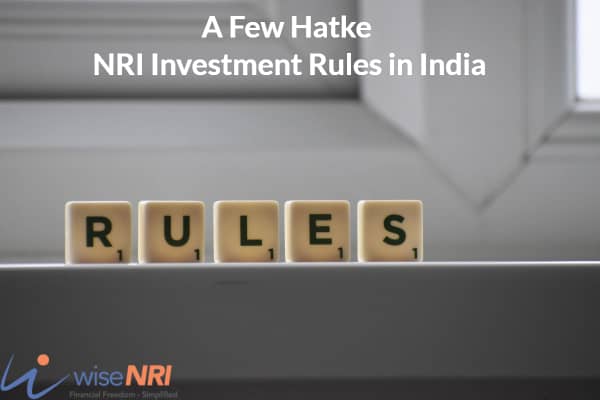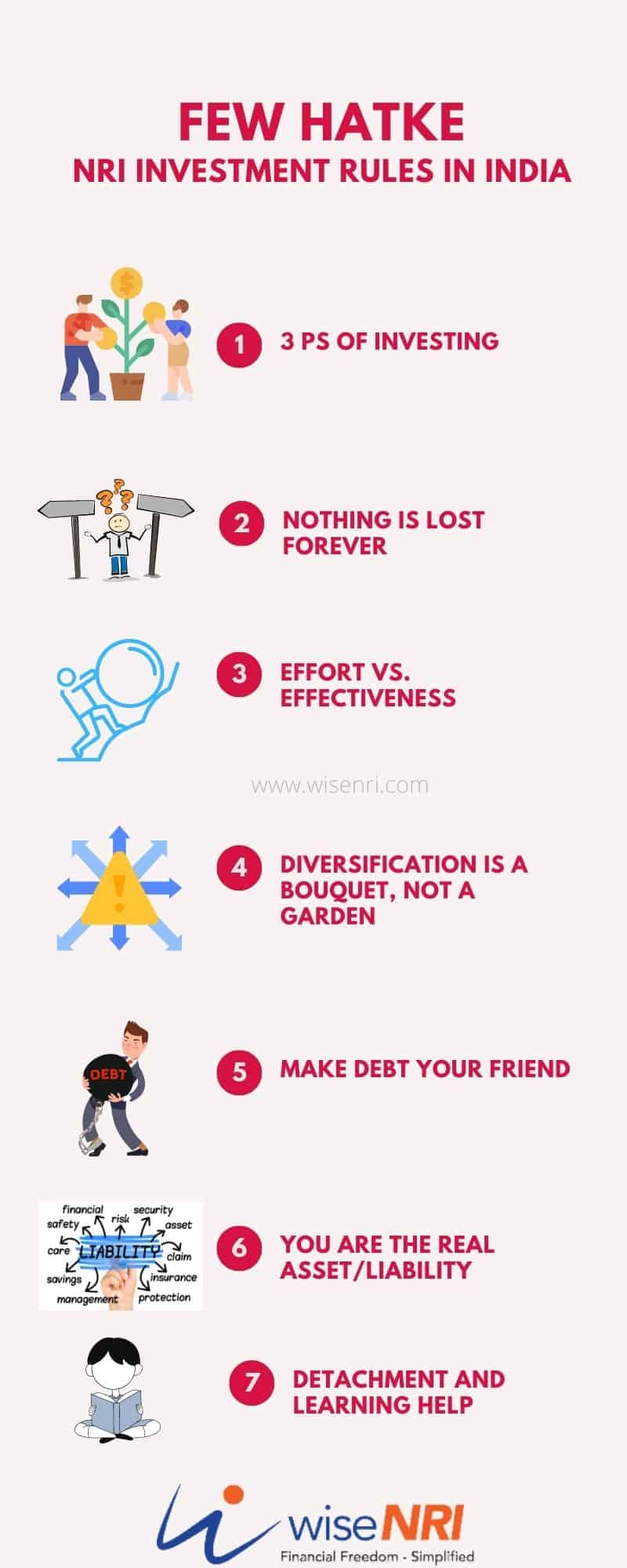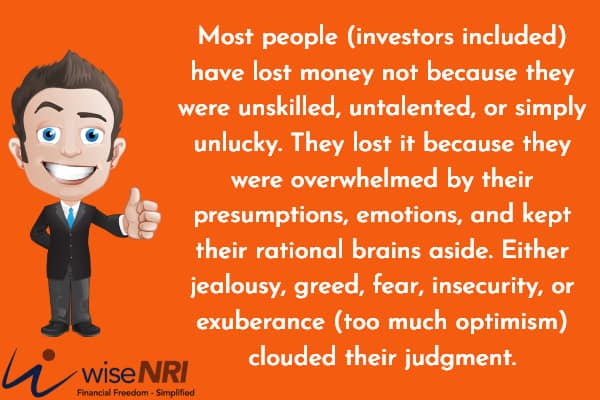We present some Hatke (not so common or unorthodox) rules for NRI investors to help them navigate the ups and downs of financial markets. These rules or guidelines are the essence of the time-tested wisdom of investment geniuses.

Must Check – NRI Investment Options in India
Here are Few Different NRI Investment Rules in India
1. 3 Ps of Investing
The well-run and profitable businesses are the biggest compounding machines that you can ever find. By becoming a part-owner of these businesses, you can participate in the journey to the top. But stock markets are in grip of bulls and bears who either inflate the stocks to the stratosphere or bury them in the deepest trenches.
The vagaries of stock markets can make the toughest of hearts sink. Persistence, patience, and perseverance are the 3 Ps that can make you money, as they help you sail through the toughest of times.
Stock markets entice you to take ‘action’ with its carpet bombing of information bombs. But most of the time you lose money whenever you act on the news or a stock tip. Therefore, you should let a professional manage your money, especially exposure to markets, through mutual funds or ETFs.
2. Nothing is Lost Forever
If you look at the history of stock markets – the markets have seen a major crash almost every 10-12 years. But one thing that is as consistent as crashes is the fact that they have rebound and created new peaks after every crash. That is why you will see an upward trending chart for stock market indices – S&P 500 of USA or BSE SENSEX or NSE’s NIFTY of India.
Similar to stock market crashes, the bond/debt market also gives jitters – in form of a major player defaulting – from time to time, and then goes on to generate superior returns for investors.
Therefore, if you have emergency funds, are properly and adequately covered by insurance, and have alternate income streams, then a stock market crash is nothing to worry about. As long as the fundamentals of the economy you are invested in – India, USA, or the UK for example – then you should remember that nothing is lost, and it is not the time to give up.
If anything, probably it is the time to find great companies at bargain prices and buying high-quality bonds to bring stability to your portfolio. (or allow professionals to do that work) If you expect corrections, you will be better prepared for them and won’t fear them.
If your exposure is in debt-ridden companies or debt instruments with high credit risk, then the story may be different altogether. You could lose your capital in such bets.
Again, this may seem quite difficult to you, but with professional guidance and training, you can make the most of market crashes.

Must Read – Investment restrictions for NRIs In India
3. Effort vs. Effectiveness
In the real, physical world – where labour is respected, and in some cases worshipped – it is a human tendency to associate putting in more hours as being more productive. Physical endurance has nothing to do with the mental abilities, talent, and emotional balance required of an investor.
The primitive human mind applies the millennium-old principles to something that is hardly a few centuries old. The stock markets have given paradoxical results confusing far too many people by rewarding inaction over action – time in the market vs. timing the market.
Most investors have lost money because they tried to “time” the market. They forget that the most successful investors in the world have spent “time in” the markets.
4. Diversification is a Bouquet, Not a Garden
One of the rules that we discussed in an earlier article stated that diversification into different asset classes, sectors, industries, economies, etc. can help stabilize your portfolio returns. It will help you contain the downward pull while leaving enough room to make most while the sun shines.
But over-diversification – owning too many funds from too many AMCs, with no clear rationale – is as counterproductive as over-concentration of your portfolio. A balanced portfolio would not comprise more than 1-2 funds in a category associated with a clearly defined goal. A liquid fund for short-term needs, a hybrid fund for medium-term, and an aggressive equity fund for long-term goals.
If you have more than 6-7 equity funds – then it is the perfect time to take a hard look at them and pare the flab. Too many funds mean – higher confusion, no way of managing them, most of the funds not linked to any goal, and even the laggards draining your time & money.
5. Make Debt Your Friend
Taking debt for reasons where it is not making you more money is one of the most fatal financial decisions. Warren Buffet had famously said, “if you buy things you don’t need, soon you will have to sell the things you need.”
There are many ways in which you can make debt your friend from a foe:
- Use credit cards to monitor expenses
- Pay all card dues in time to (a) avoid heavy interest, and (b) extend your cash cycle by 40-50 days.
- Pre-pay or pay off high-interest debt(s) with any windfall.
- Don’t take on debt to speculate or to invest in other securities.
- Debt for productive assets – like equipment, industry, etc. – is appreciable, only if the cost of financing is low and you can earn from the asset more than what you owe for it.
- Education loan is a good loan because you are your biggest asset.
- Invest in debt instruments of secure union government bonds and highly rated papers of state governments, local body governments, and corporates.
Check – Common Investment Mistakes of NRIs

6. You are the Real Asset/Liability
For most people, assets and liabilities are something of a quantitative metric, that shows on the opposites side of their balance sheets, and rightly so. But investors are a different breed altogether. The real asset or the liability for an investor is her attitude, emotions, and mental strength (or the lack of it)!
Most people (investors included) have lost money not because they were unskilled, untalented, or simply unlucky. They lost it because they were overwhelmed by their presumptions, emotions, and kept their rational brains aside. Either jealousy, greed, fear, insecurity, or exuberance (too much optimism) clouded their judgment. They quit at the bottom after they had entered at the top!
The handful of people who have made money – in any endeavour – have done so by keeping their emotions aside and make business decisions with a rational mind, confidence, and reliance on data & facts.
Don’t Panic: No one has ever made money, consistently at least, by panicking. You need to have a steady focus like Arjuna, the warrior prince from Mahabharat. You also need to know when to leave the table, as there is nothing left for you, or the table is stacked against you – unlike Yudhishthira, Arjuna’s eldest brother.
Be Brave and Flexible: Not fixate on a single ratio, formula, stock, or fund. Something that worked yesterday, may not work today, and may not even exist tomorrow. Take a position or change it only based on what the data indicates. Be brave and flexible to admit your mistakes, cut losses, and move on.
Keep Hope out of Equation: Out of all emotions, hope can be the most deceiving – it may come in bear markets, it may come in bull markets, it may come in flat markets. Investments require keeping hope out of the equation and preparing for the worst – recall emergency fund, insurance, and multiple streams of income. Keep your expectations for returns a tad lower than a conservative estimate. And your expectations of taxes, inflation, and other negative factors, a tad above the pessimistic estimate. Beware of Rumors, Tips, and Hype.
7. Bonus Rule: Detachment and Learning Help
Continuing the Mahabharata analogy, being as much detached from your investments as Lord Krishna was from the world, can lead you to financial nirvana. But even if you could achieve a modicum of that, you can still become financially secure, and more importantly independent. Loss and profits are part of the game, and your next move should be independent of the outcome of the last.
Learning about numbers, ratios, macroeconomics, business climate, and market trends is necessary. Similarly, ignorance of inflation, risks, volatility, and tax rules is more important than knowing about returns. A crisis would hit you harder if you are ignorant, and you might never recover from it either.
A personal financial advisor can help you stay focused and check your emotional impulses. S/he also helps you learn the ropes in as little time and with as little effort as possible.

Can OCI apply for Aadhar card in India